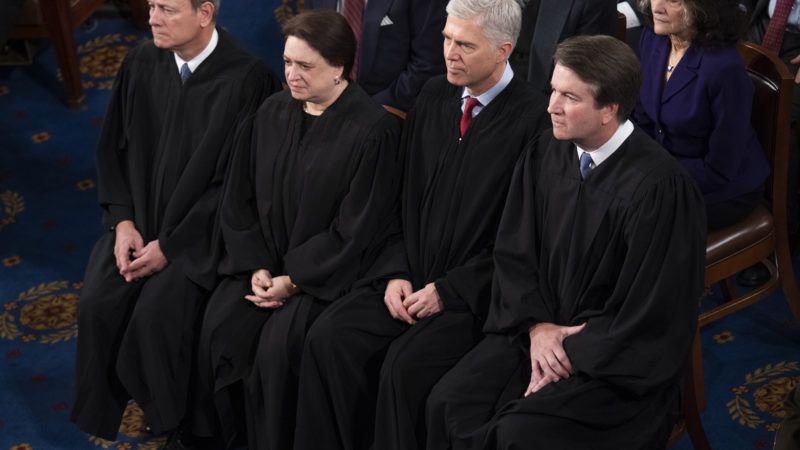Supreme Court Upholds State Law Limiting the Use of the Insanity Defense
Kansas “will not wholly exonerate a defendant on the ground that his illness prevented him from recognizing his criminal act as morally wrong.”

The U.S. Supreme Court ruled today that a Kansas law limiting the scope of the insanity defense does not violate the U.S. Constitution. "Defining the precise relationship between criminal culpability and mental illness involves examining the workings of the brain, the purposes of the criminal law, the ideas of free will and responsibility," declared the majority opinion of Justice Elena Kagan. And "that is a project for state governance, not constitutional law."
The case is Kahler v. Kansas. James Kahler murdered his wife, his two daughters, and his wife's grandmother after his wife divorced him. His lawyers argue that when he committed those murders "he was experiencing overwhelming obsessive compulsions and extreme emotional disturbance, and may have disassociated from reality." A medical expert testified during trial that Kahler's mental state was so "severely degraded…that he couldn't refrain from doing what he did."
The insanity defense has a long pedigree in Anglo-American law. To "establish a defence on the ground of insanity," ruled Lord Chief Justice Nicholas Tindal of England's Court of Common Pleas in M'Naghten's Case (1843), "it must be clearly proved that, at the time of the committing of the act, the party accused was labouring under such a defect of reason, from disease of the mind, [1] as not to know the nature and quality of the act he was doing; or [2] if he did know it, that he did not know he was doing what was wrong."
Most U.S. states follow the two-part standard spelled out in M'Naghten's Case. But Kansas does not. It follows only the first part. "It is a defense to a prosecution under any statute that the defendant, as a result of mental disease or defect, lacked the mental state required as an element of the offense charged," state law holds. "Mental disease or defect is not otherwise a defense."
Kahler's lawyers asked the Supreme Court to rule this approach unconstitutional. Kansas law "accounts for only intent, not lack of moral culpability. But even severely mentally ill people can form the intent required to commit a crime, even if they do not understand that it is wrong," Kahler's legal team told the justices. "Thus, in Kansas, so long as a defendant intentionally kills another human being—even if he delusionally believes the devil told him to do it, or that the victim was an enemy soldier trying to kill him—he is guilty of murder. The upshot is that Kansas criminally punishes people who are, by any definition, insane. The Constitution prohibits that result."
Today the Supreme Court ruled that the Constitution does not prohibit that result. "Kansas, unlike many States, will not wholly exonerate a defendant on the ground that his illness prevented him from recognizing his criminal act as morally wrong," wrote Justice Kagan. "The issue here is whether the Constitution's Due Process Clause forces Kansas to do so….We hold that the Clause imposes no such requirement." Kagan's opinion was joined by Chief Justice John Roberts and by Justices Clarence Thomas, Samuel Alito, Neil Gorsuch, and Brett Kavanaugh.
Writing in dissent, Justice Stephen Breyer, joined by Justices Ruth Bader Ginsburg and Sonia Sotomayor, faulted the majority for shortchanging both "Anglo-American legal history" and "basic principles long inherent in the nature of the criminal law itself." Kansas has "eliminated the core of a defense that has existed for centuries: that the defendant, due to mental illness, lacked the mental capacity necessary for his conduct to be considered morally blameworthy," Breyer protested.
The Supreme Court's decision in Kahler v. Kansas is available here.


Show Comments (31)